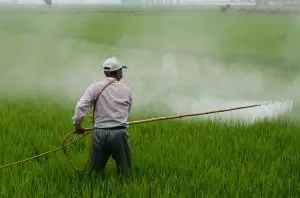Insecticides and Pesticides are some of the most toxic chemicals used in the present world regularly.
Insecticides are agents used to kill or repel the insects present in a vicinity.
The insects commonly aimed at are mosquitoes, flies, cockroaches, bugs, etc.
These insecticides are used regularly indoors like in homes, hotels, theaters, restaurants, recreation clubs, and to a great extent outdoors like agriculture farms and gardens.
Their use is inevitable as these insects cause trouble to humans and animals by the spread of dreadful diseases like malaria, dengue, filaria, typhoid, cholera, etc.
In plants, they are also responsible for the spread of infections, and sometimes they cause diseases in plants.
Pesticides
- These are chemical agents used to kill pests on plants.
- They include insecticides, anti-mollusks, and also antimicrobial like antibacterial, antivirals, anti-fungi agents, etc.
- They are mostly aimed at safeguarding agriculture farms and gardens for better yield.

Uses of pesticides and Insecticides:
They are useful for both agriculture and human purposes like
In agriculture:
1. Plant pesticides increase crop yield in agriculture by protecting plants.
2. Pesticide use also controls the spread of diseases by fungi, bacteria, insects from one region of farms to other regions or even countries.
It was seen that some pests which were not present came here due to the import of wheat or other countries.
So the insect or bacteria, if controlled, diseases spread between countries or places can be prevented.
In Human places of residence:
1. Household pesticides repel insects causing trouble and pain by a sting to humans and the animals in their area of stay like homes, kennels, etc.
2. They even prevent the spread of diseases like malaria, chikungunya, filaria, etc.
Effect of pesticides & insecticides :
Pesticides toxicity has hazardous effects on plants, soil, humans, animals, and birds. The effect is poisonous, and many physiological systems are affected by them. Due to soil, air, and water pollution, these chemicals and pesticides get into the body.
♦ Chemistry of pesticides is organophosphate in nature. Once inside the body, they cause various nervous system-related disorders, nausea, vomiting, sedation, burr vision, and sometimes even death.
♦ Further, they kill useful insects like honey bees and butterflies, enhancing cross-pollination in crops for better yield.
♦ Honey bees form nectar and are useful for honey manufacturing industries. These industries suffer due to heavy pesticide pollution.
Pesticides in the food make the quality of food grain less demanding in the market, and hence the farmer gets a low price for his yield.
Types of insecticides and pesticides based on their toxicity
Insecticides and pesticides are equally toxic. However, based on their toxicity towards humans, they are graded.
As indicated by their labels, pesticides are classified into four categories.
The colors on pesticides like Red, Yellow, Green, or Blue

are mentioned based on their order of decrease in poisonous effect to humans.
Red indicates extremely poisonous.
Yellow indicates poisonous.
Green indicates moderately poisonous.
Blue indicates low poisonous.
Many pesticides under red labels are banned now.
Besides the above chemical pesticides and insecticides, there are many natural ones. These are called biopesticides. They are made from biological material or are a living agent like bacteria or fungus is used.
These biopesticides are less toxic to humans and also very compatible with the crop and soil.
Pesticide pollution:
The Environmental effects of pesticides are a concern now.
These pesticides are spread into the air, water bodies like rivers, canals, soil due to their regular use in the form of spraying, powders, solutions in agriculture.
In homes and gardens, when used as mosquito repellents, bed bug spray, etc. in homes regularly enter into the physiology of humans and animals on breathing.
Those food grains grown in polluted pesticide soil enter the food chain of all the living animals.
The pesticides entering water resources travel to other places spreading the pollution of this pesticide.
Degradation of pesticides in soil occurs over weeks, so the pollution takes time to decrease.
Those pesticide residues in water can enter the rivers and seas theirs by deteriorating the health of water and land animals.
The best way to minimize human toxicity and prevent environmental pollution by an increased rate of degradation is to rely on natural pesticides.